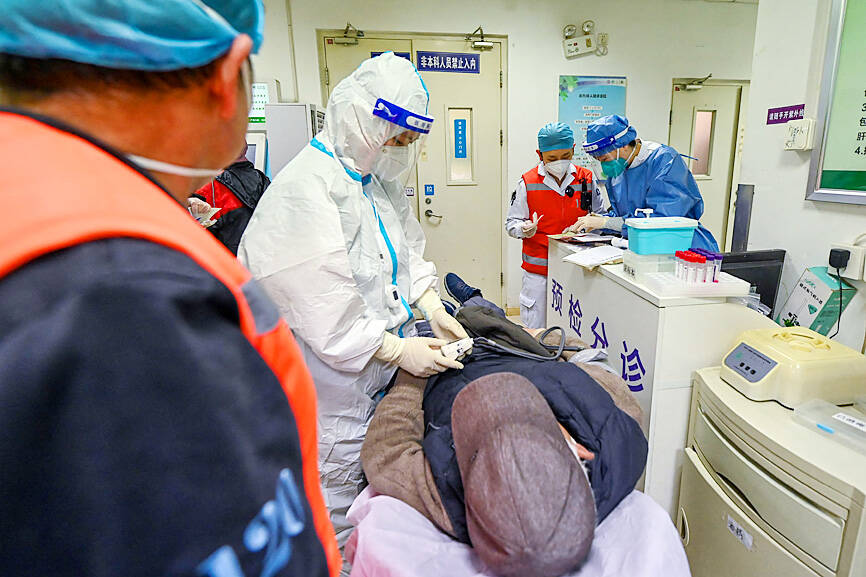China’s official data on COVID-19 deaths have always been transparent, state media late on Thursday quoted a senior health official as saying, despite the official figures being tiny compared with other countries and reports that the country’s hospitals are overwhelmed with cases of the disease.
Beijing’s release of all virus information was done “in the spirit of openness,” the official told a Chinese State Council news briefing, Xinhua news agency reported.
A national disease control body yesterday said there were about 5,500 new local cases and one death, but with the end of mass testing and the narrowing of criteria for what counts as a COVID-19 fatality, those numbers are no longer believed to reflect reality.

Photo: Reuters
Some experts estimate there might be as many as 9,000 daily deaths.
“China has always been publishing information on COVID-19 deaths and severe cases in the spirit of openness and transparency,” said Jiao Yahui (焦雅輝), director of the Chinese National Health Commission’s Bureau of Medical Administration.
Jiao said that China counts COVID-19 deaths as cases only if they died of respiratory failure induced by the virus after testing positive with a nucleic acid test, rather than other countries that include all deaths within 28 days of positive tests.
“China has always been committed to the scientific criteria for judging COVID-19 deaths, from beginning to end, which are in line with the international criteria,” Jiao said.
The commission last week said it would no longer release an official daily COVID-19 death toll.
Health risk analysis firm Airfinity said it currently estimates 9,000 daily deaths and 1.8 million infections per day in China, while it also expects 1.7 million fatalities across the country by the end of April.
The UK-based research company said its model was based on data from Chinese provinces, before changes to reporting infections were implemented, combined with case growth rates from other countries that tried to suppress the transmission of the virus before lifting restrictions.
China said this week it would end mandatory quarantine on arrival, after earlier this month announcing it had abandoned a raft of tough measures to contain the virus.
The world’s most populous country said it would downgrade its management of COVID-19 from Jan. 8, treating it as a Class B infection, rather than a more serious Class A infection.
Liang Wannian (梁萬年), a senior official at the commission who oversaw China’s COVID-19 response until September 2020, called the moves appropriate, scientific and law-based, Xinhua reported.
The state news agency reported Liang as saying the shift does not mean China is letting the virus go, but that is instead directing resources to the most important areas of controlling the epidemic and treating infected people.

Shamans in Peru on Monday gathered for an annual New Year’s ritual where they made predictions for the year to come, including illness for US President Donald Trump and the downfall of Venezuelan President Nicolas Maduro. “The United States should prepare itself because Donald Trump will fall seriously ill,” Juan de Dios Garcia proclaimed as he gathered with other shamans on a beach in southern Lima, dressed in traditional Andean ponchos and headdresses, and sprinkling flowers on the sand. The shamans carried large posters of world leaders, over which they crossed swords and burned incense, some of which they stomped on. In this

The death of a former head of China’s one-child policy has been met not by tributes, but by castigation of the abandoned policy on social media this week. State media praised Peng Peiyun (彭珮雲), former head of China’s National Family Planning Commission from 1988 to 1998, as “an outstanding leader” in her work related to women and children. The reaction on Chinese social media to Peng’s death in Beijing on Sunday, just shy of her 96th birthday, was less positive. “Those children who were lost, naked, are waiting for you over there” in the afterlife, one person posted on China’s Sina Weibo platform. China’s

‘NO COUNTRY BUMPKIN’: The judge rejected arguments that former prime minister Najib Razak was an unwitting victim, saying Najib took steps to protect his position Imprisoned former Malaysian prime minister Najib Razak was yesterday convicted, following a corruption trial tied to multibillion-dollar looting of the 1Malaysia Development Berhad (1MDB) state investment fund. The nation’s high court found Najib, 72, guilty on four counts of abuse of power and 21 charges of money laundering related to more than US$700 million channeled into his personal bank accounts from the 1MDB fund. Najib denied any wrongdoing, and maintained the funds were a political donation from Saudi Arabia and that he had been misled by rogue financiers led by businessman Low Taek Jho. Low, thought to be the scandal’s mastermind, remains

Australian Prime Minister Anthony Albanese yesterday announced plans for a national bravery award to recognize civilians and first responders who confronted “the worst of evil” during an anti-Semitic terror attack that left 15 dead and has cast a heavy shadow over the nation’s holiday season. Albanese said he plans to establish a special honors system for those who placed themselves in harm’s way to help during the attack on a beachside Hanukkah celebration, like Ahmed al-Ahmed, a Syrian-Australian Muslim who disarmed one of the assailants before being wounded himself. Sajid Akram, who was killed by police during the Dec. 14 attack, and